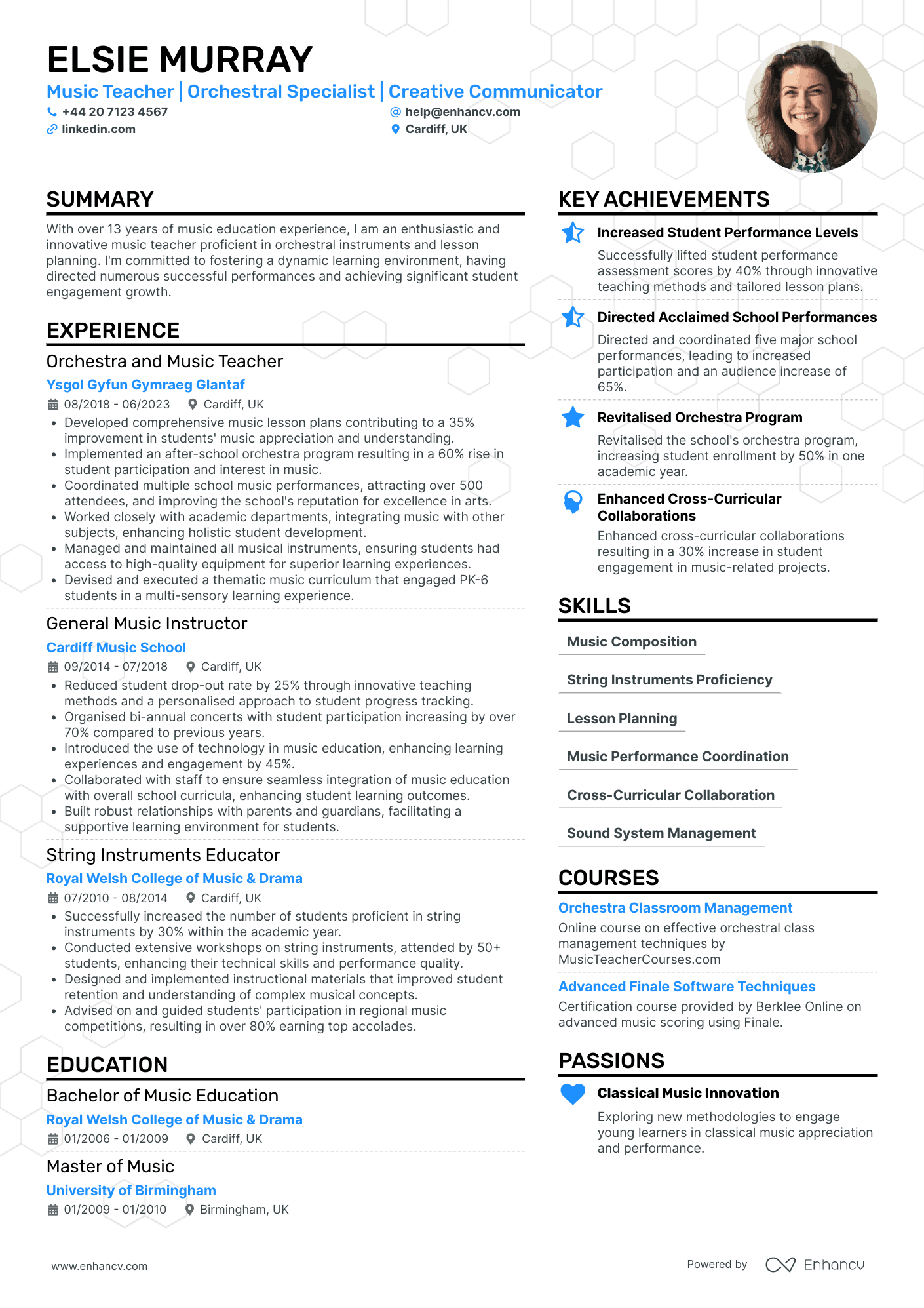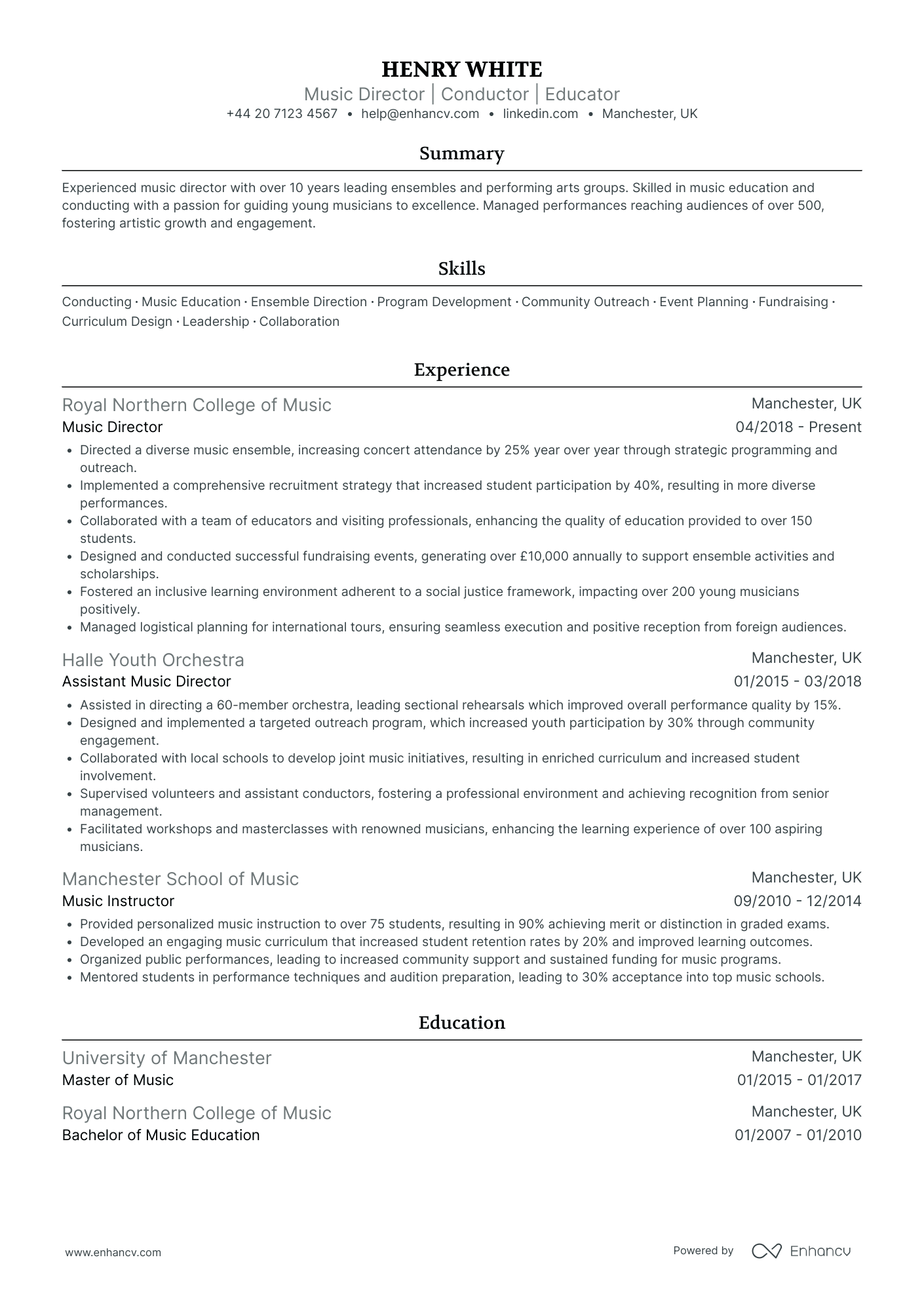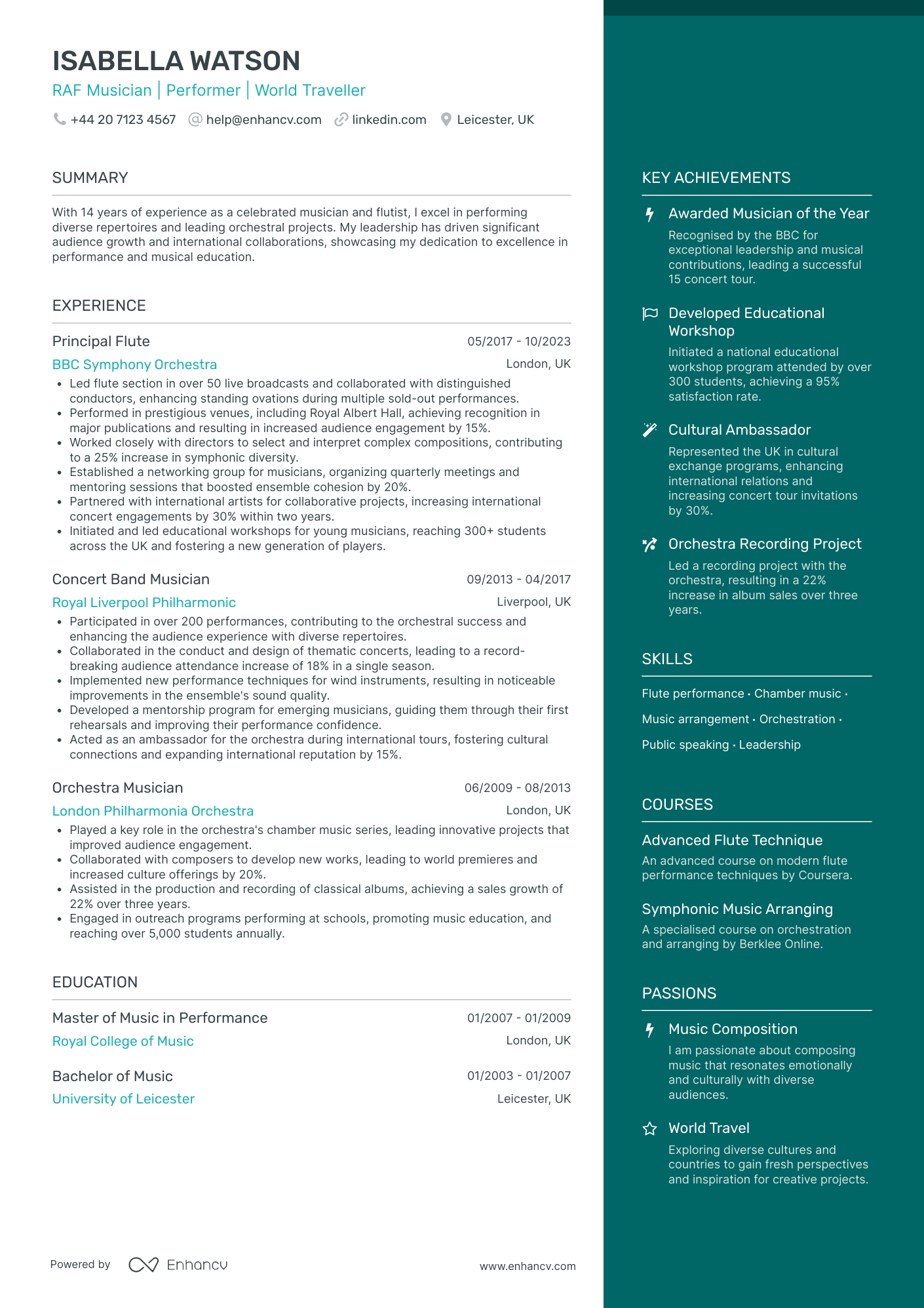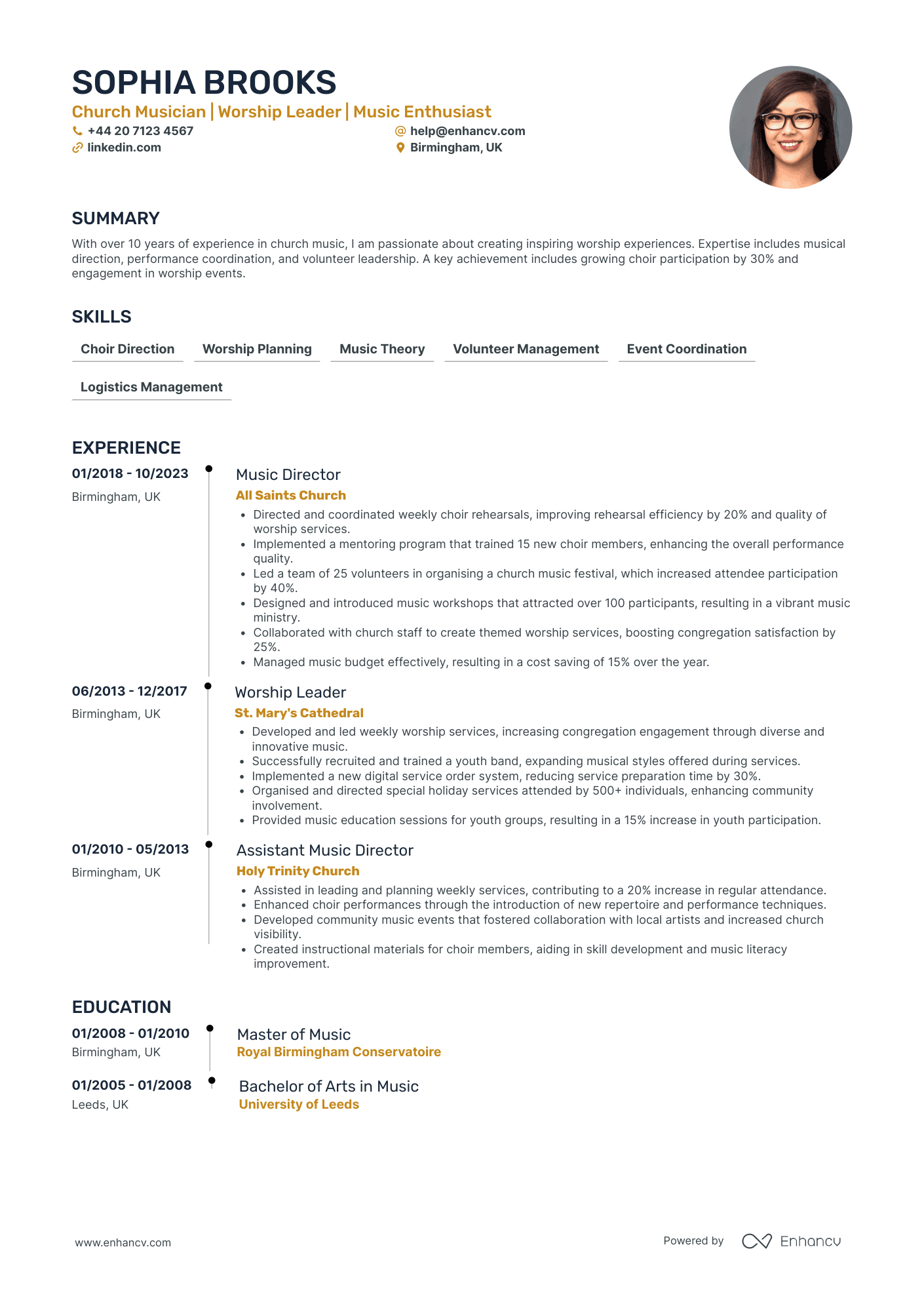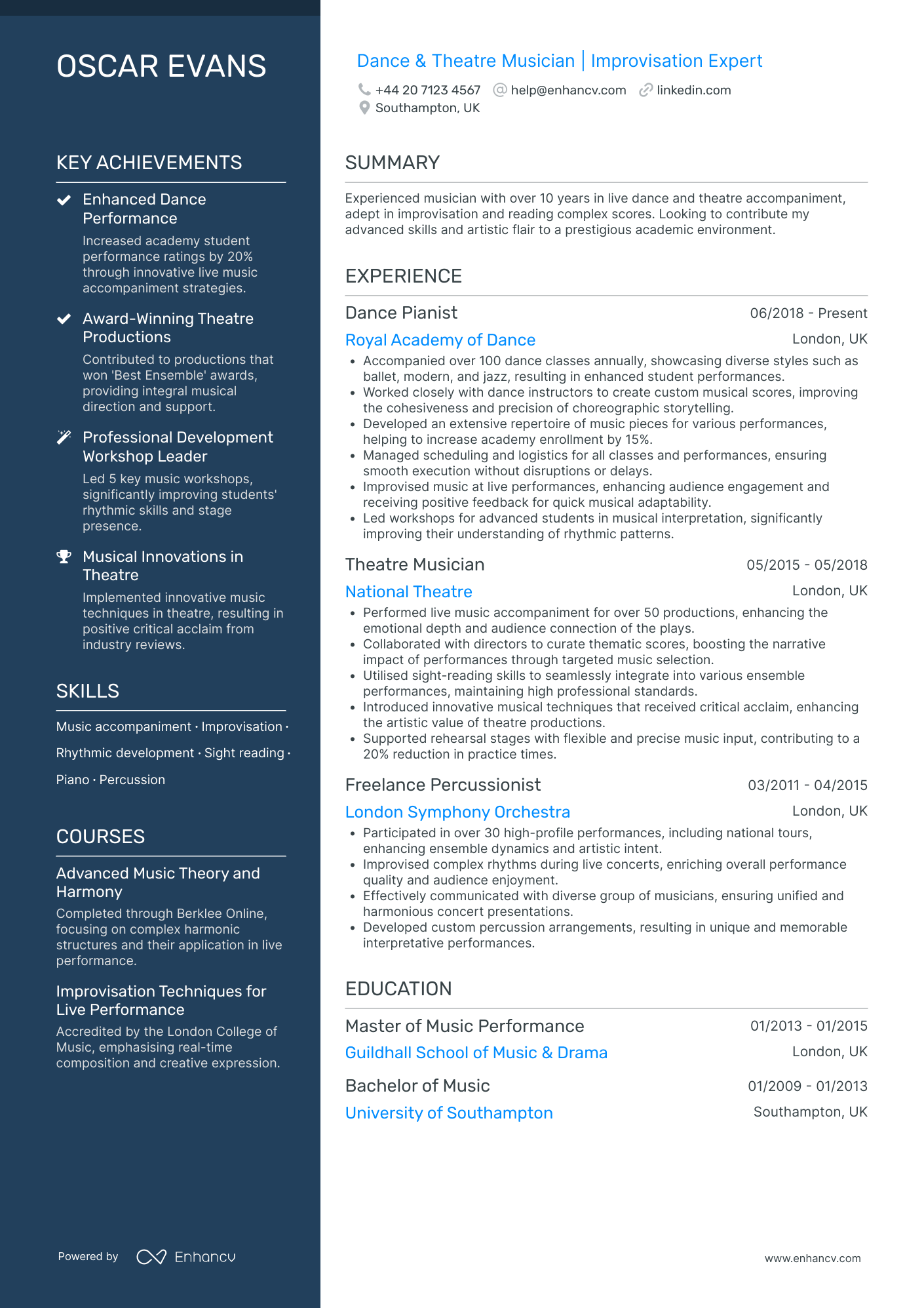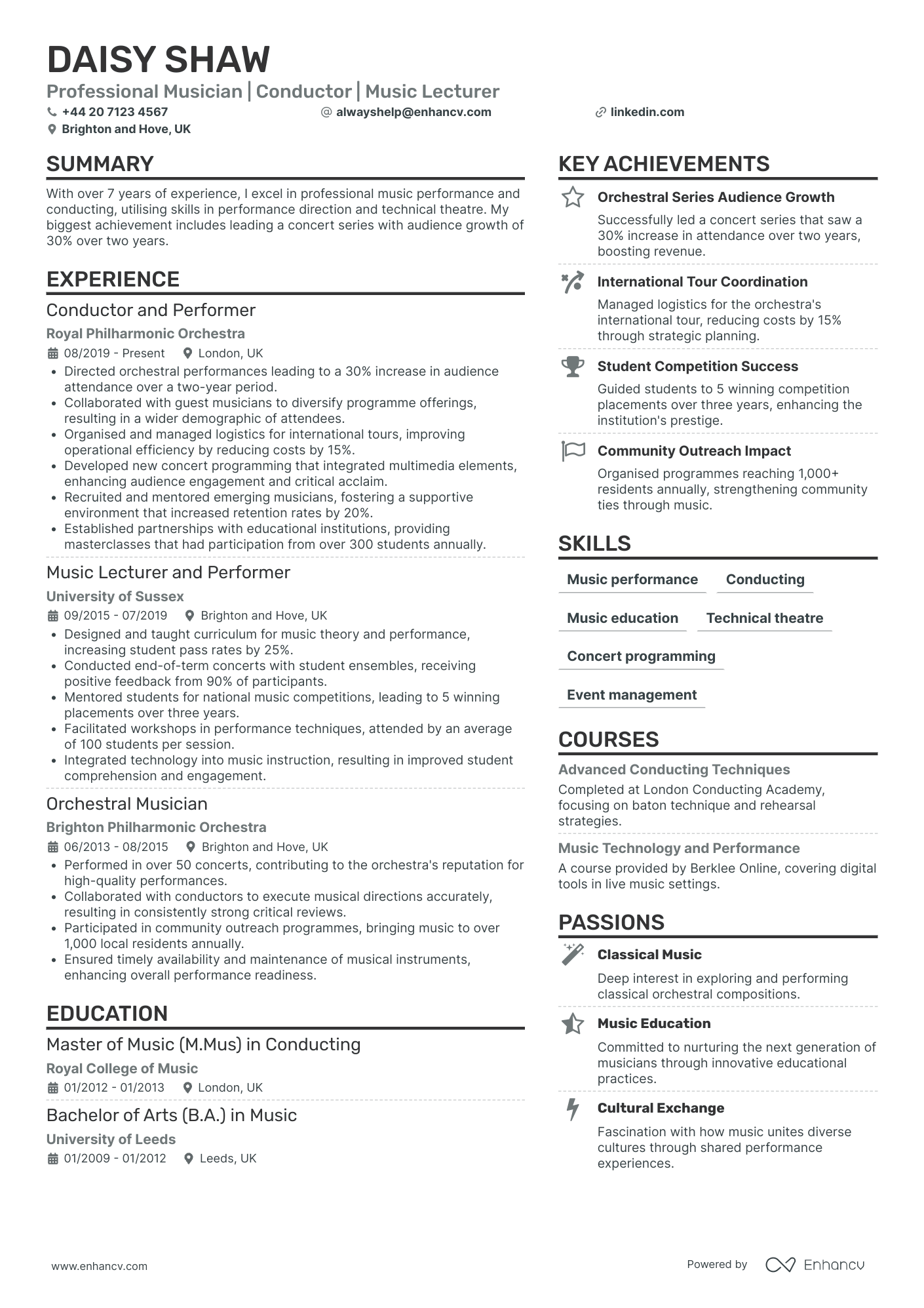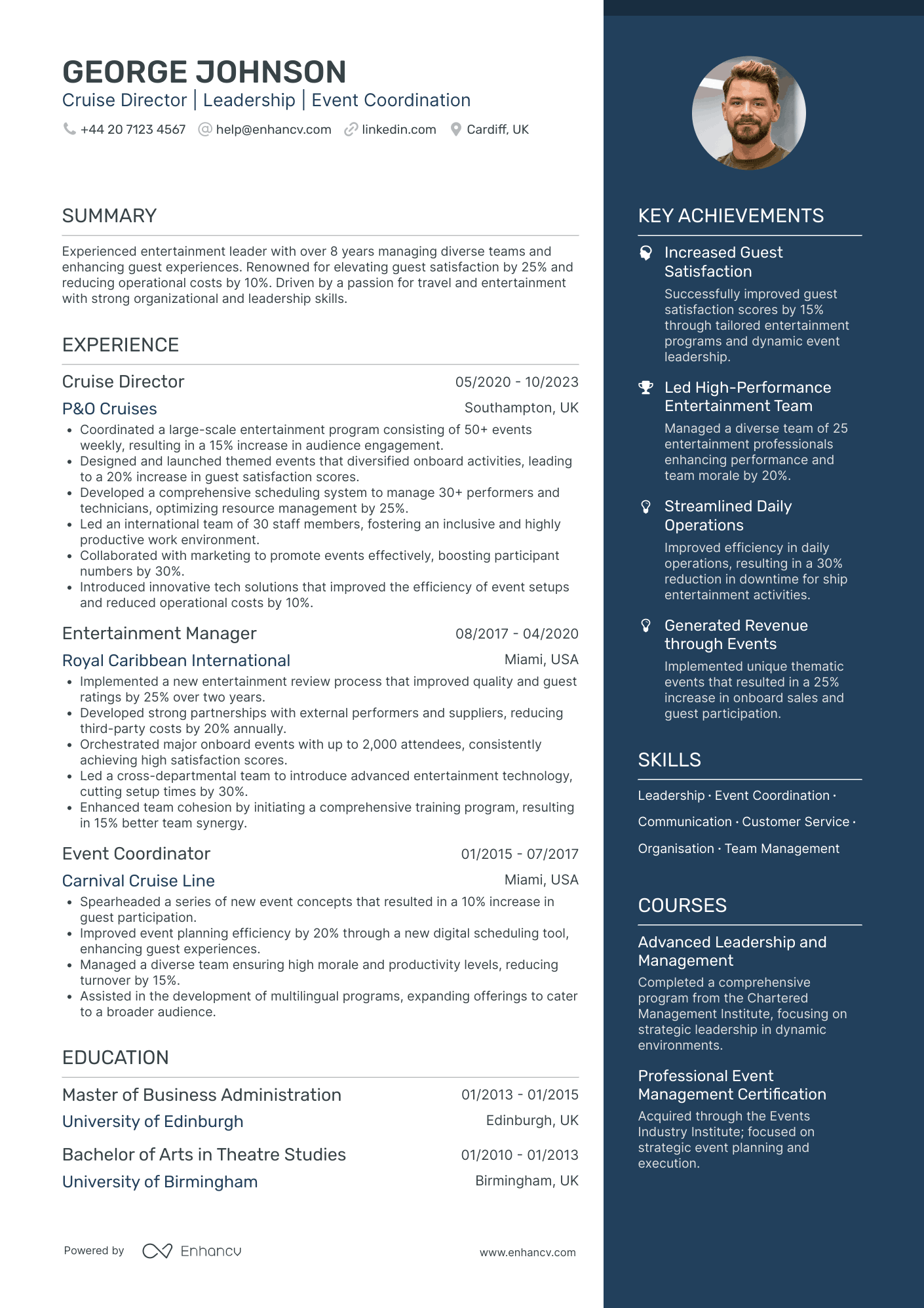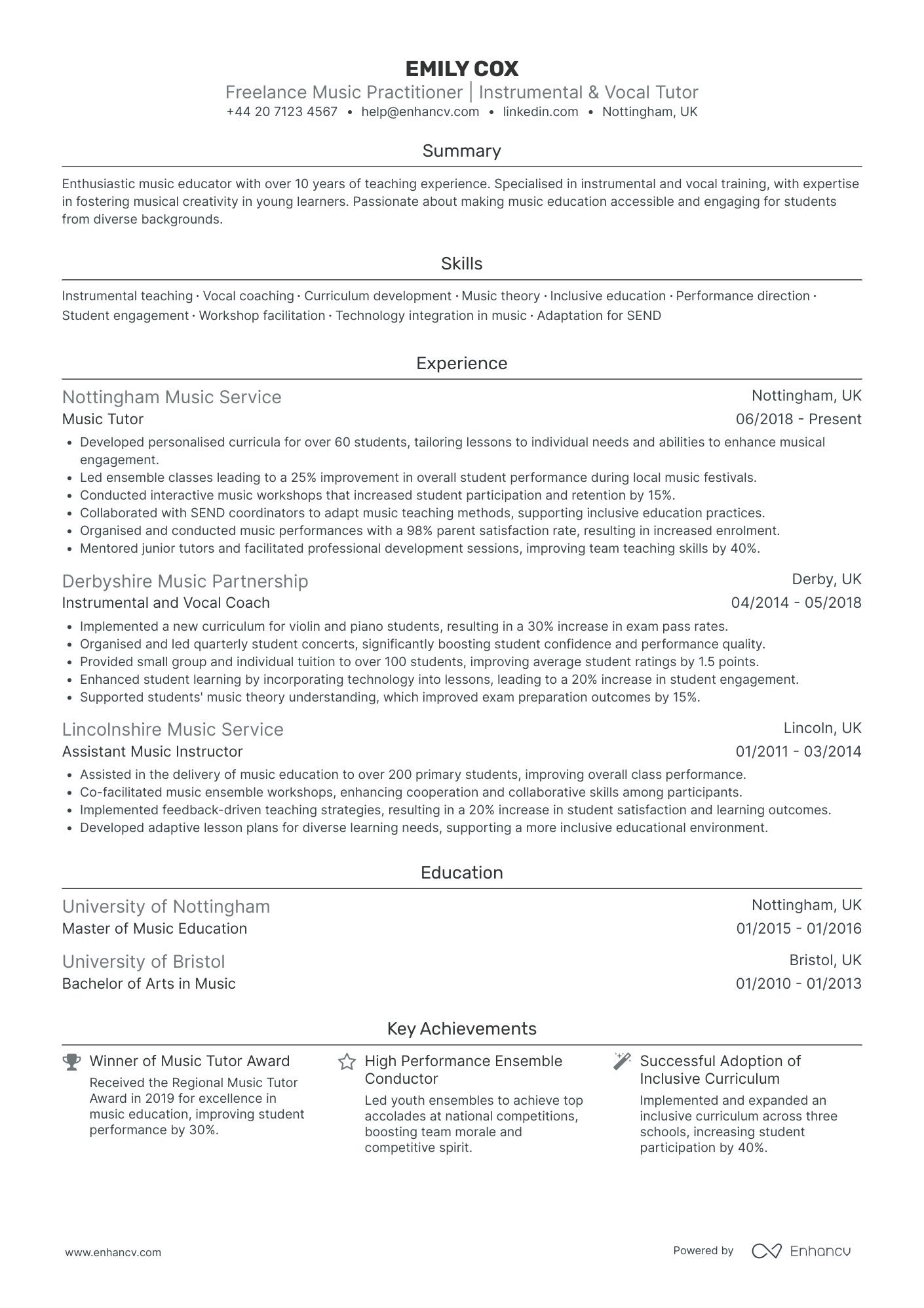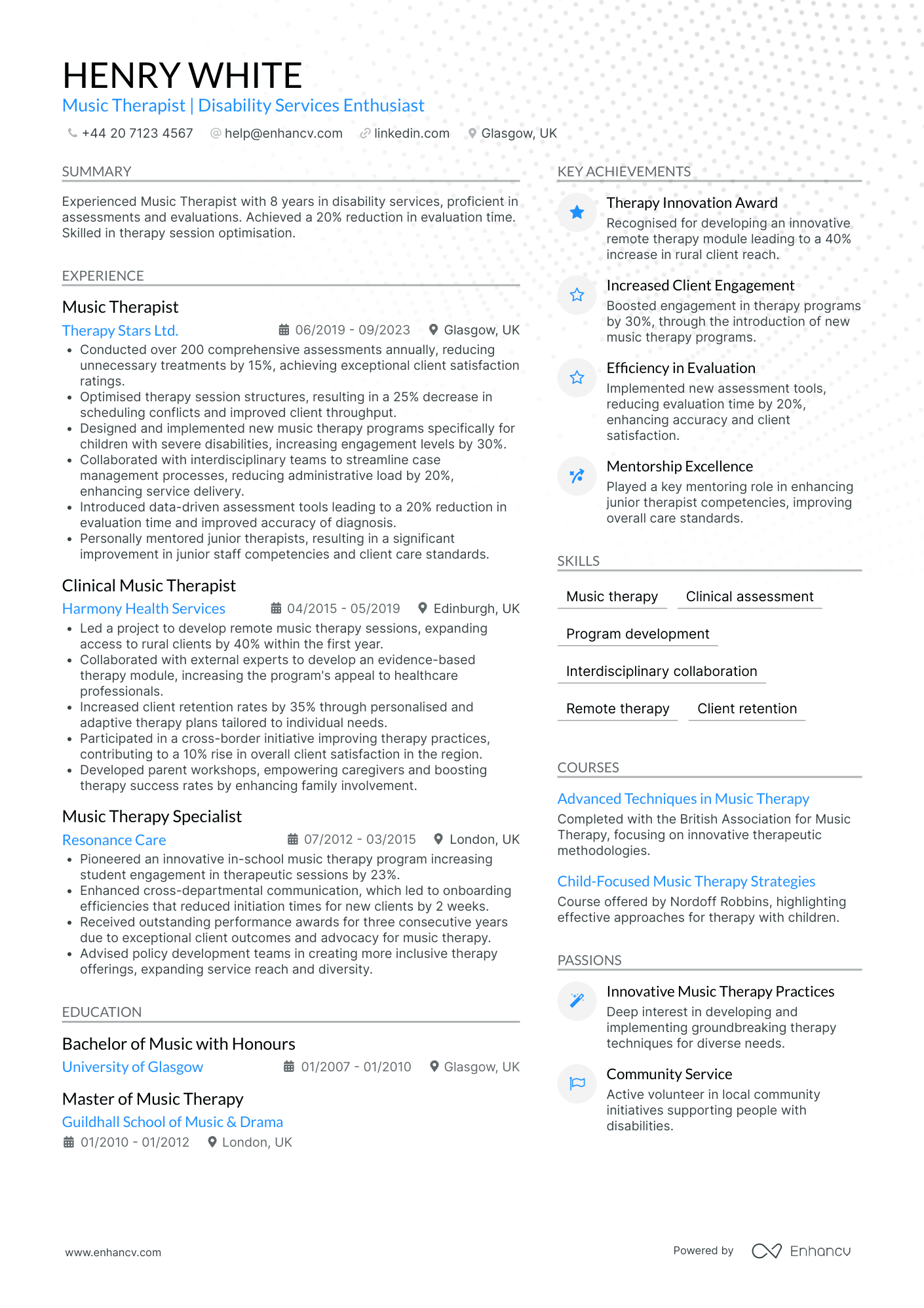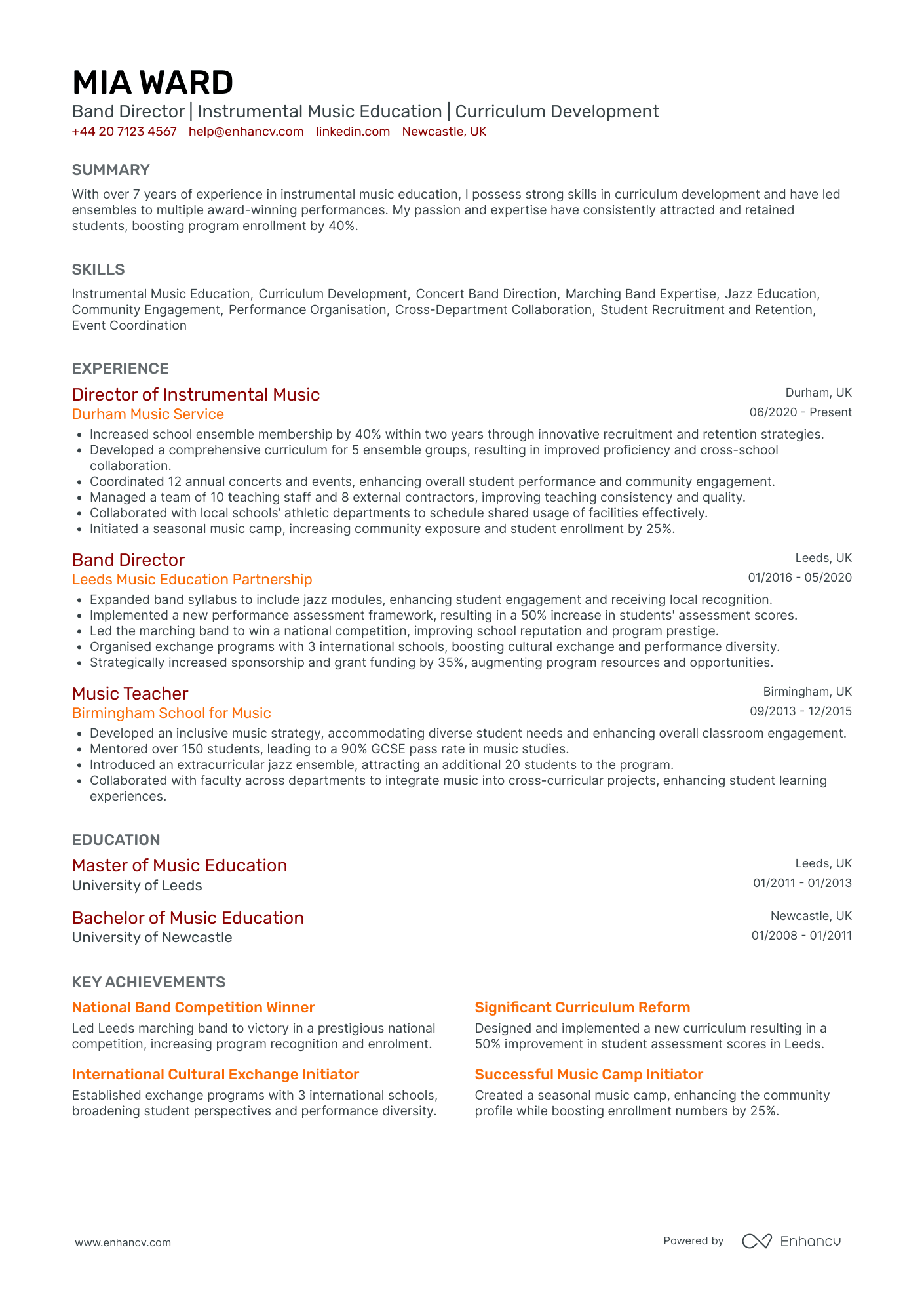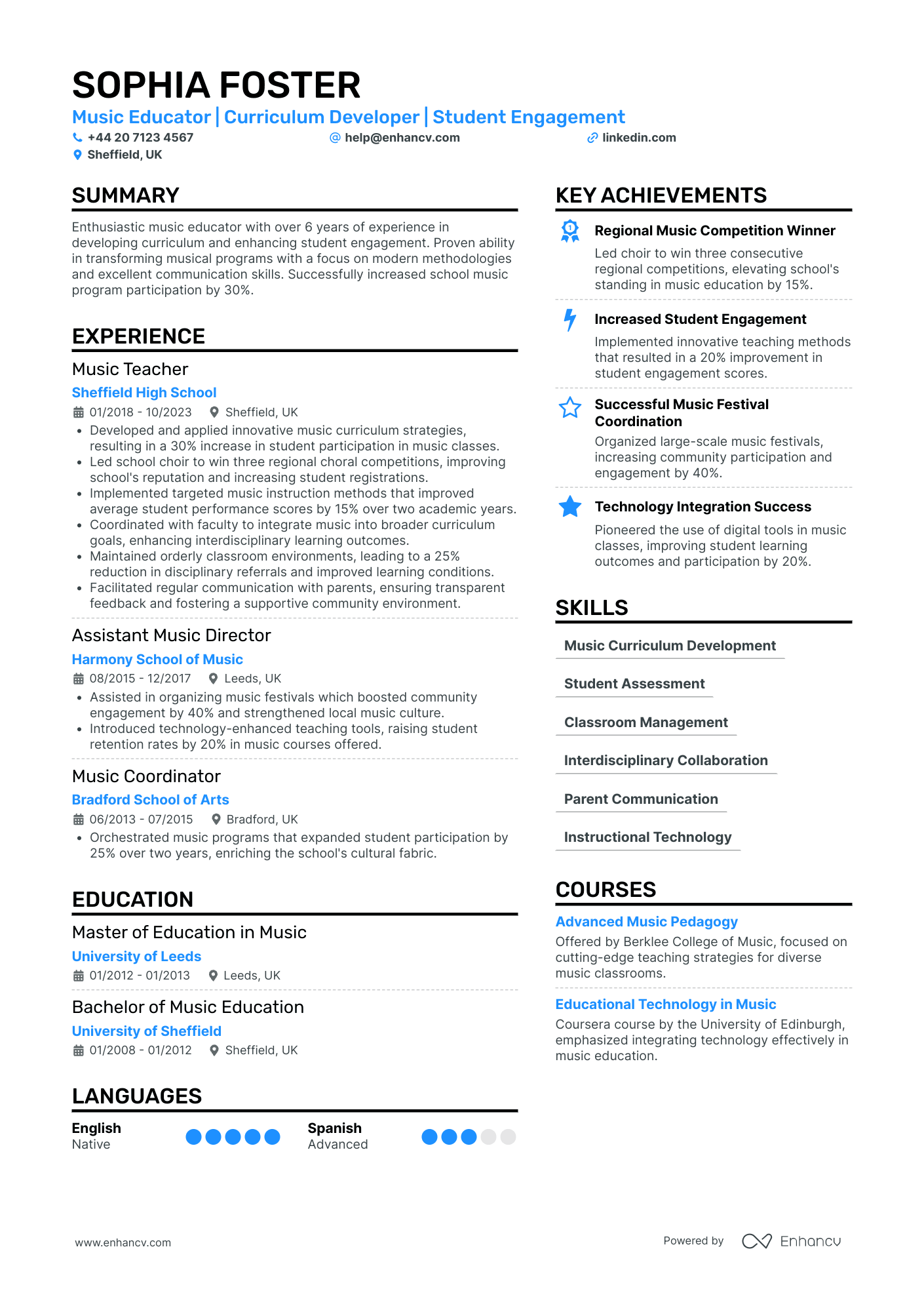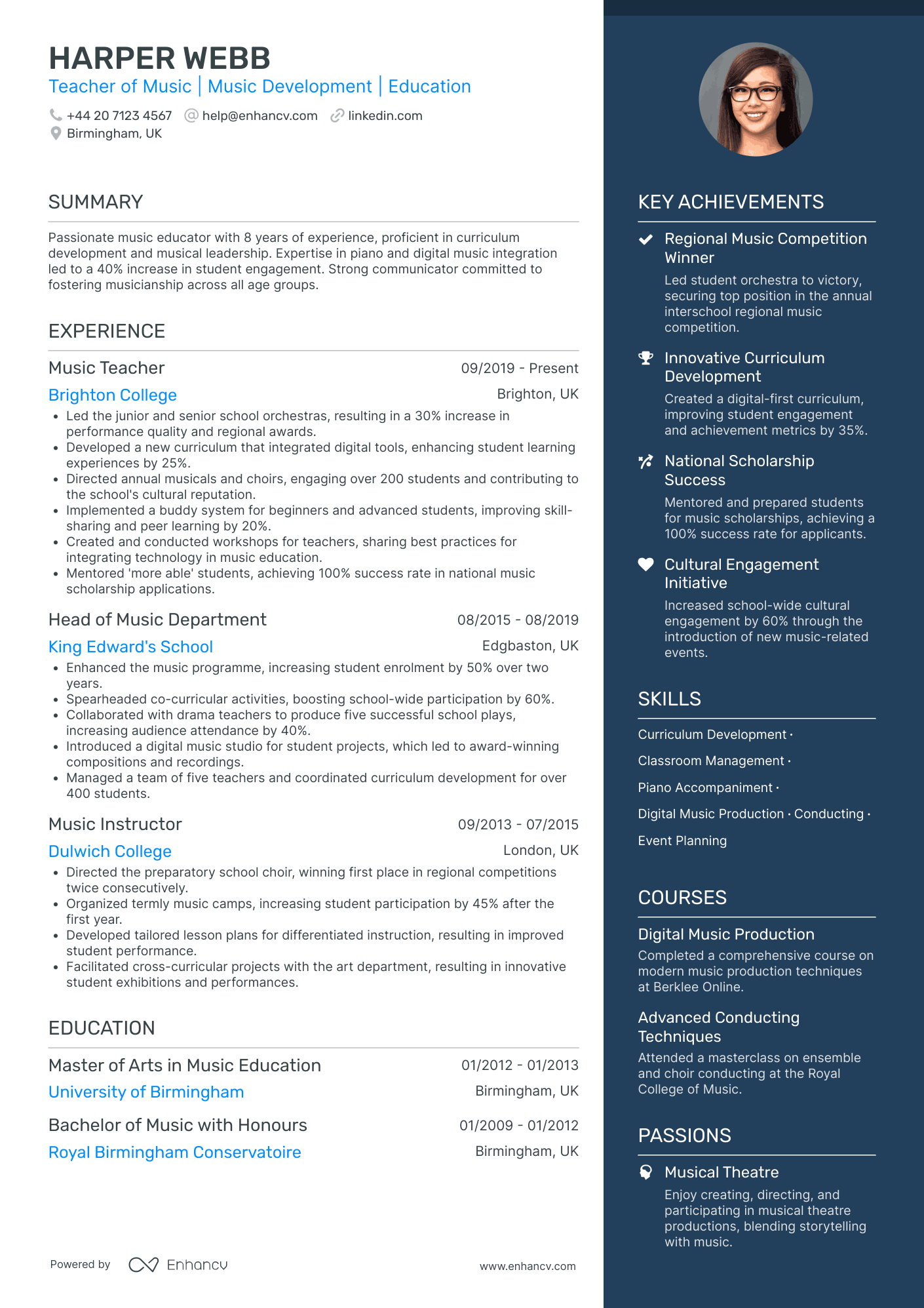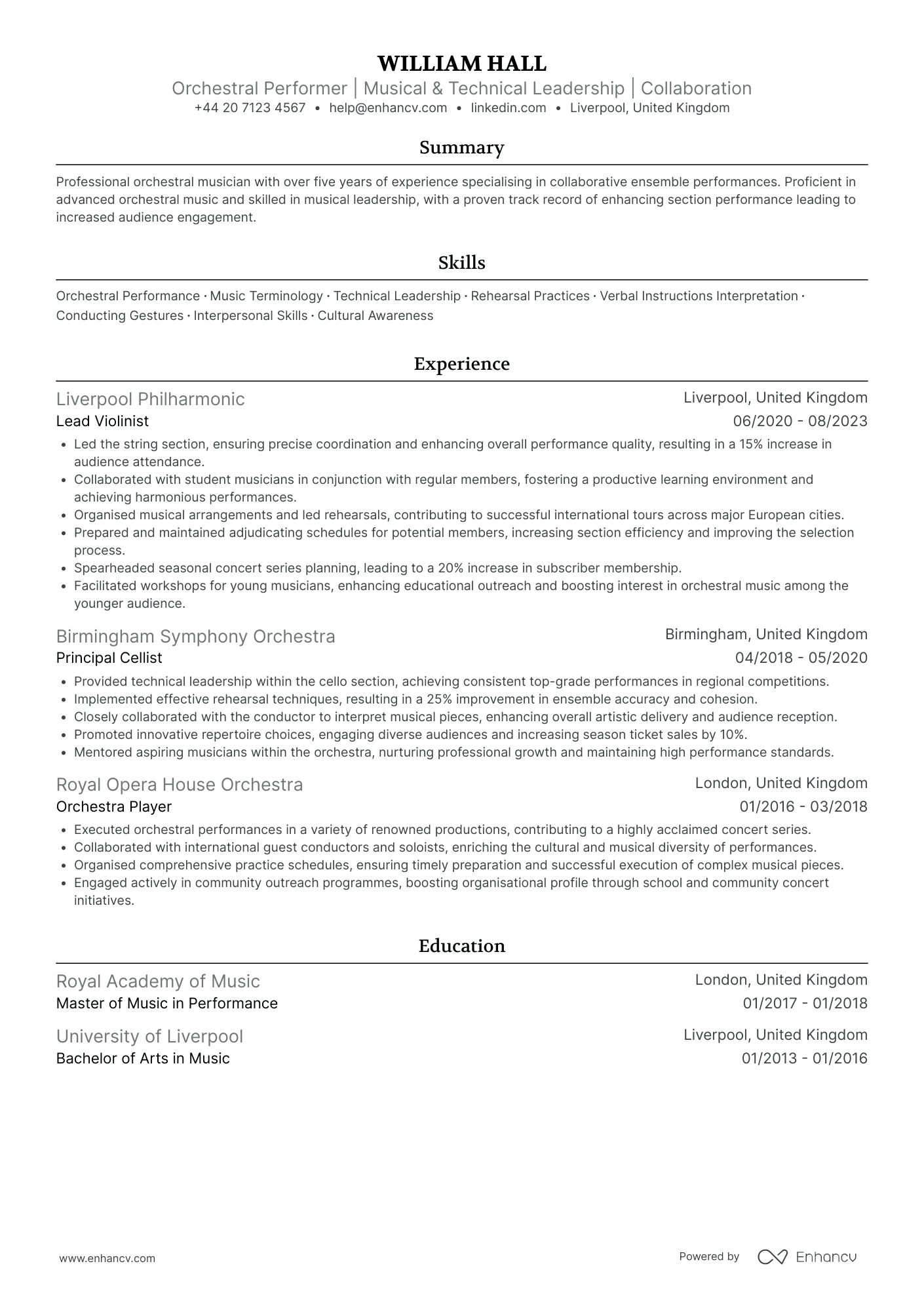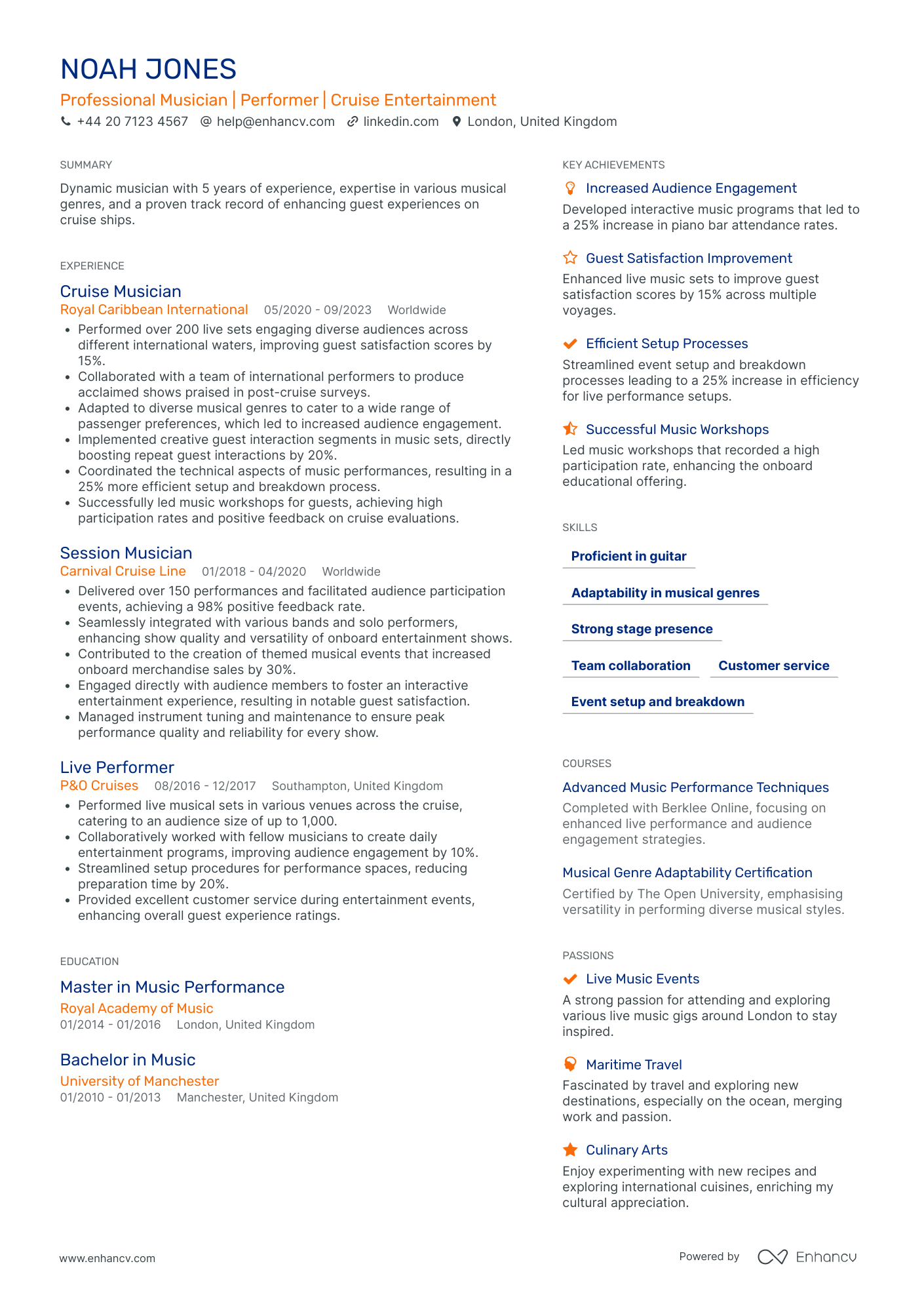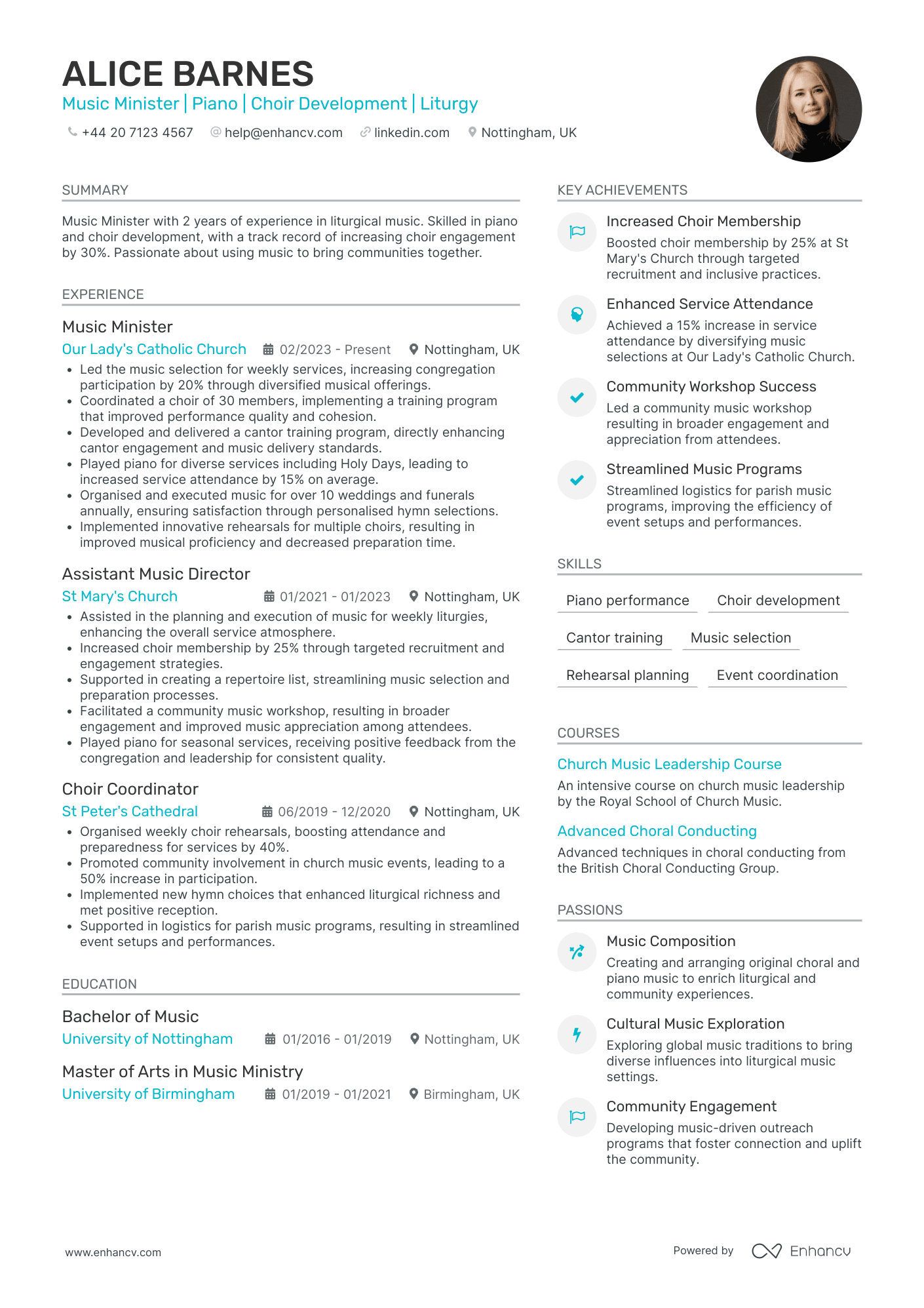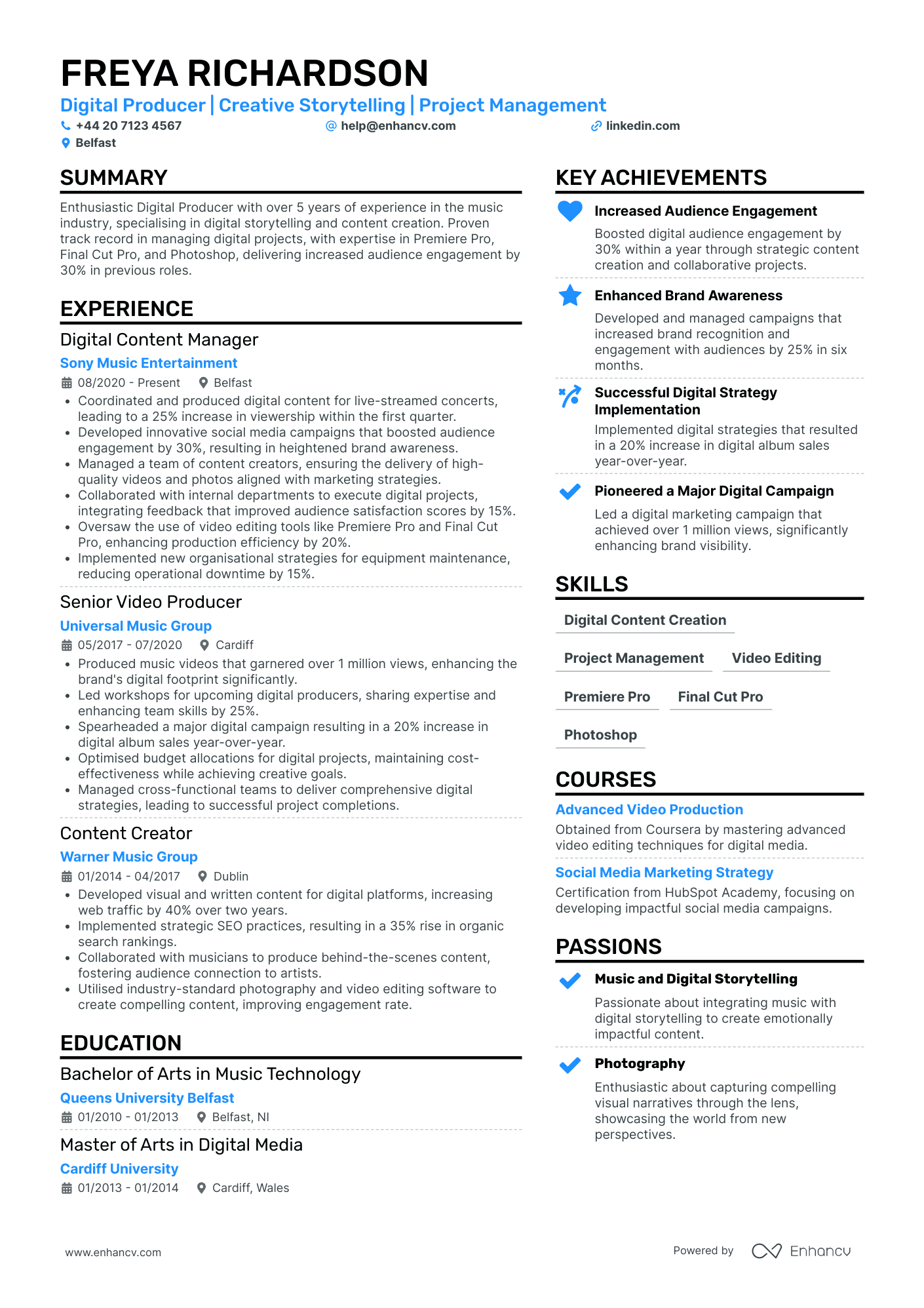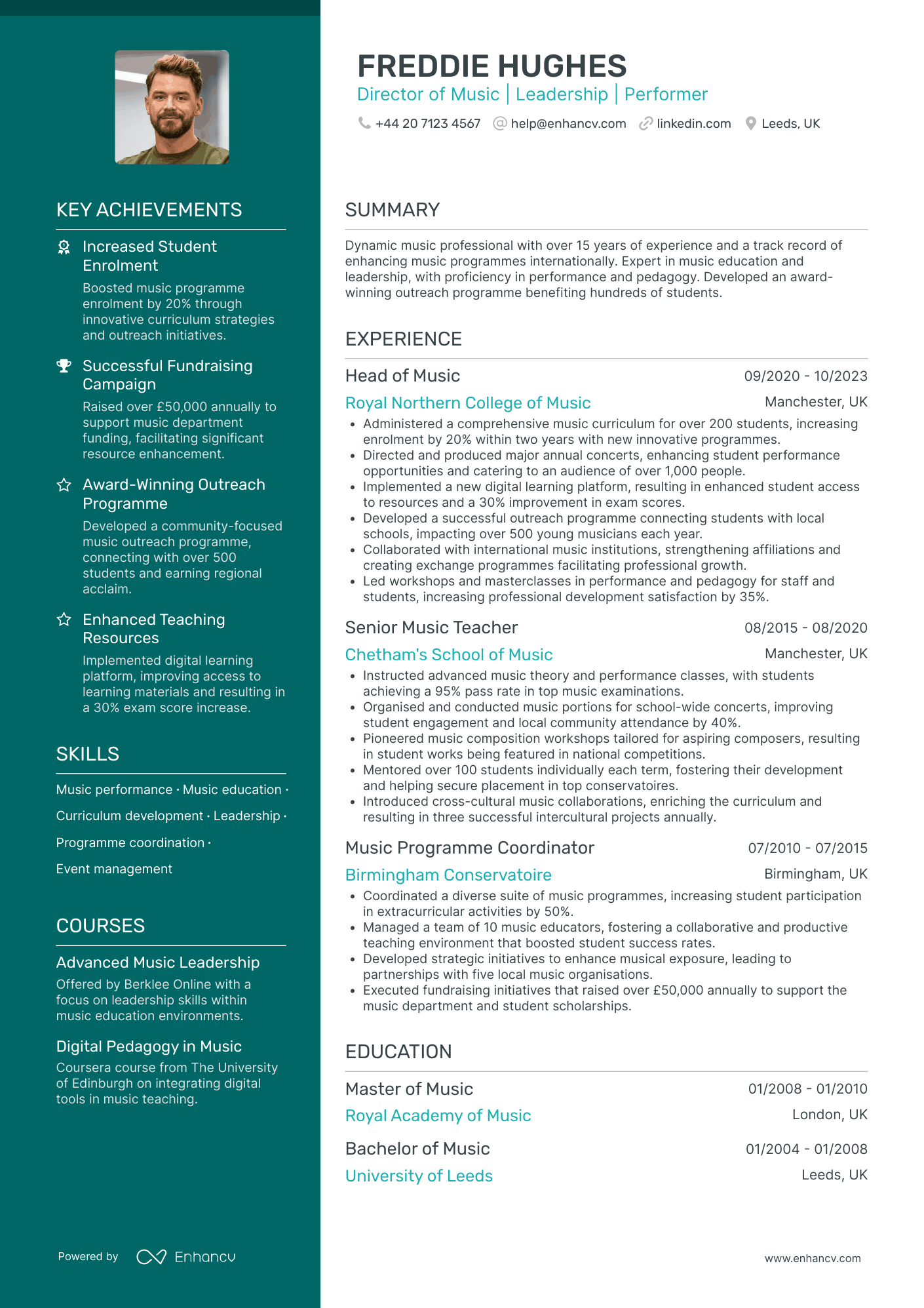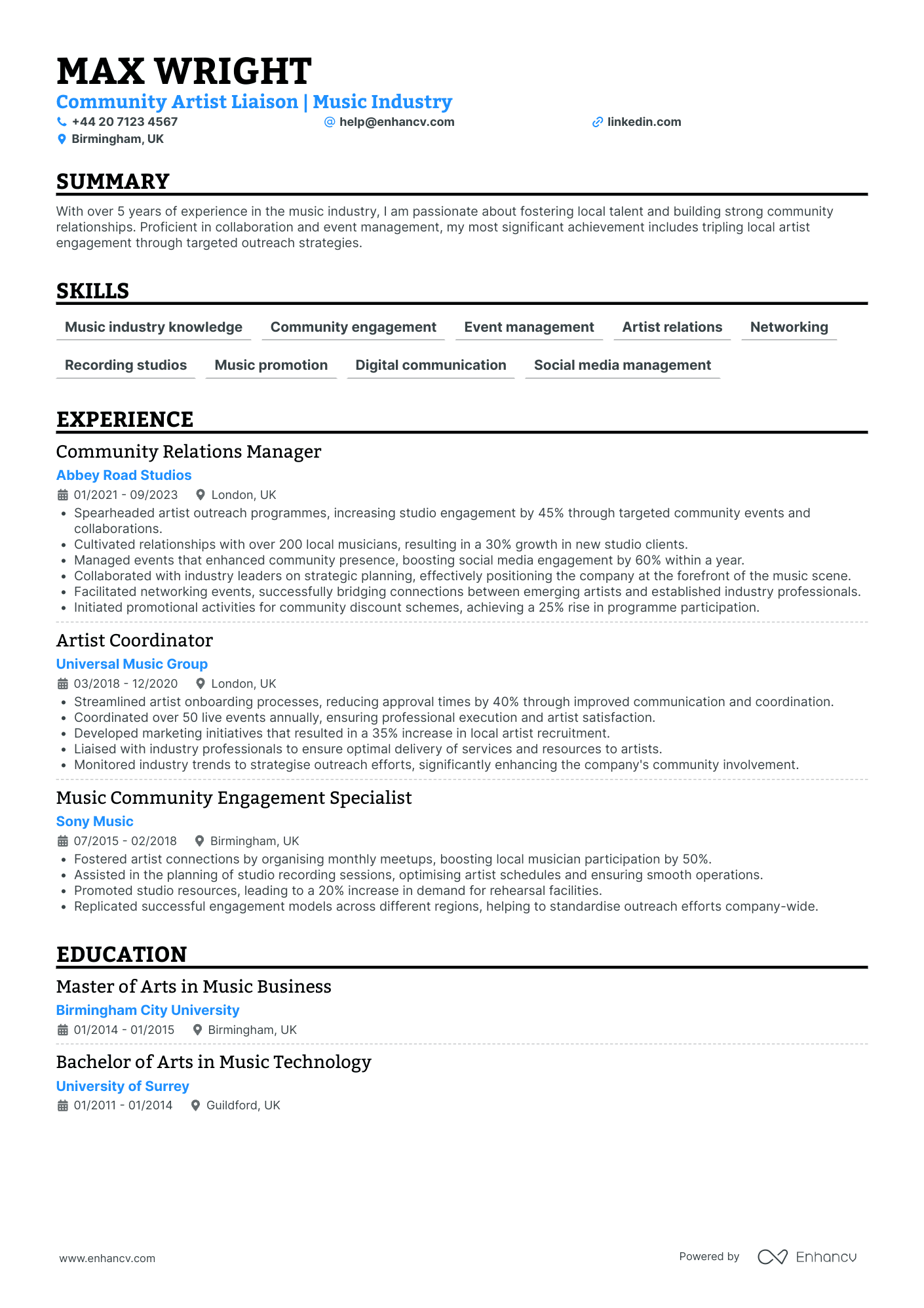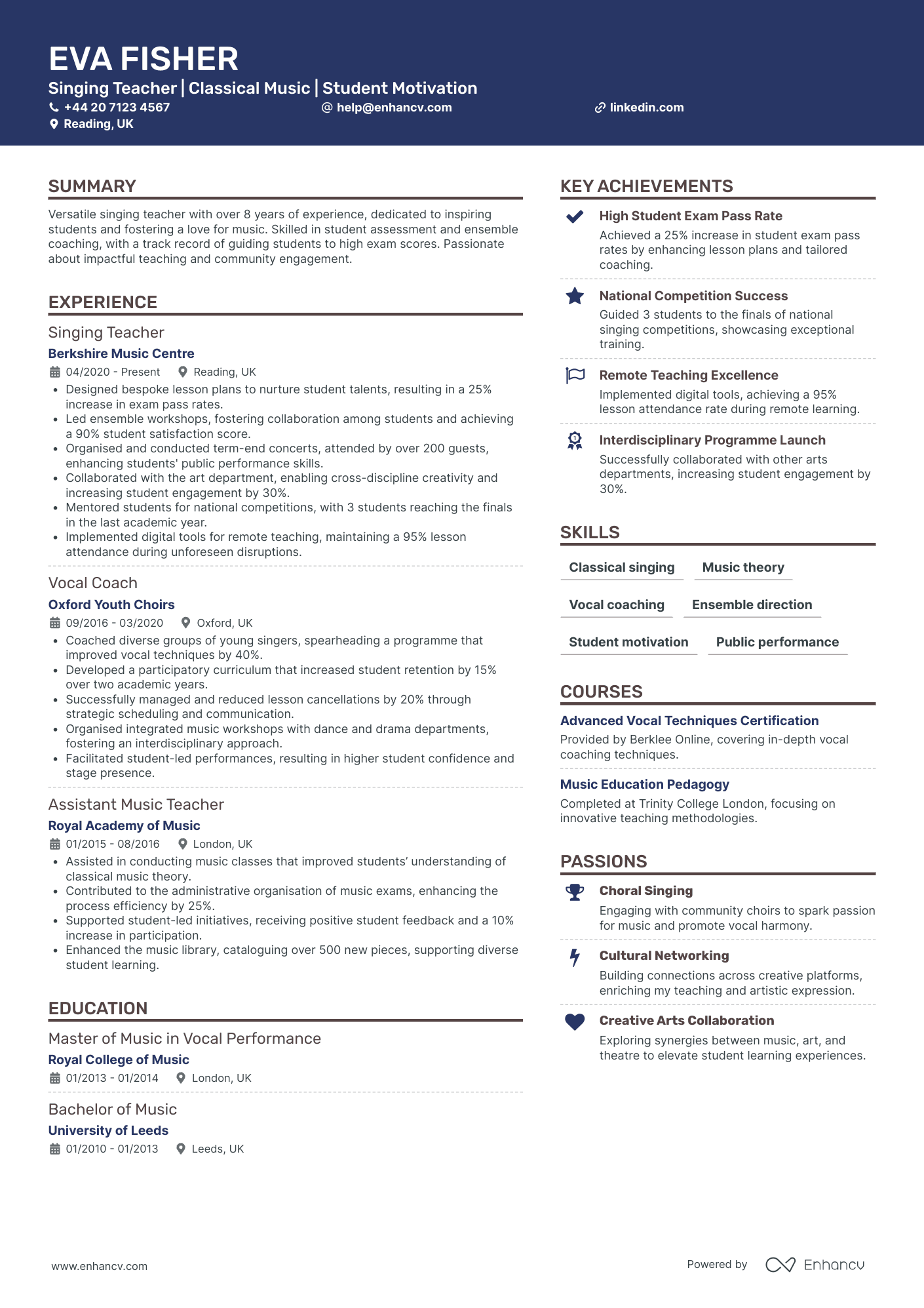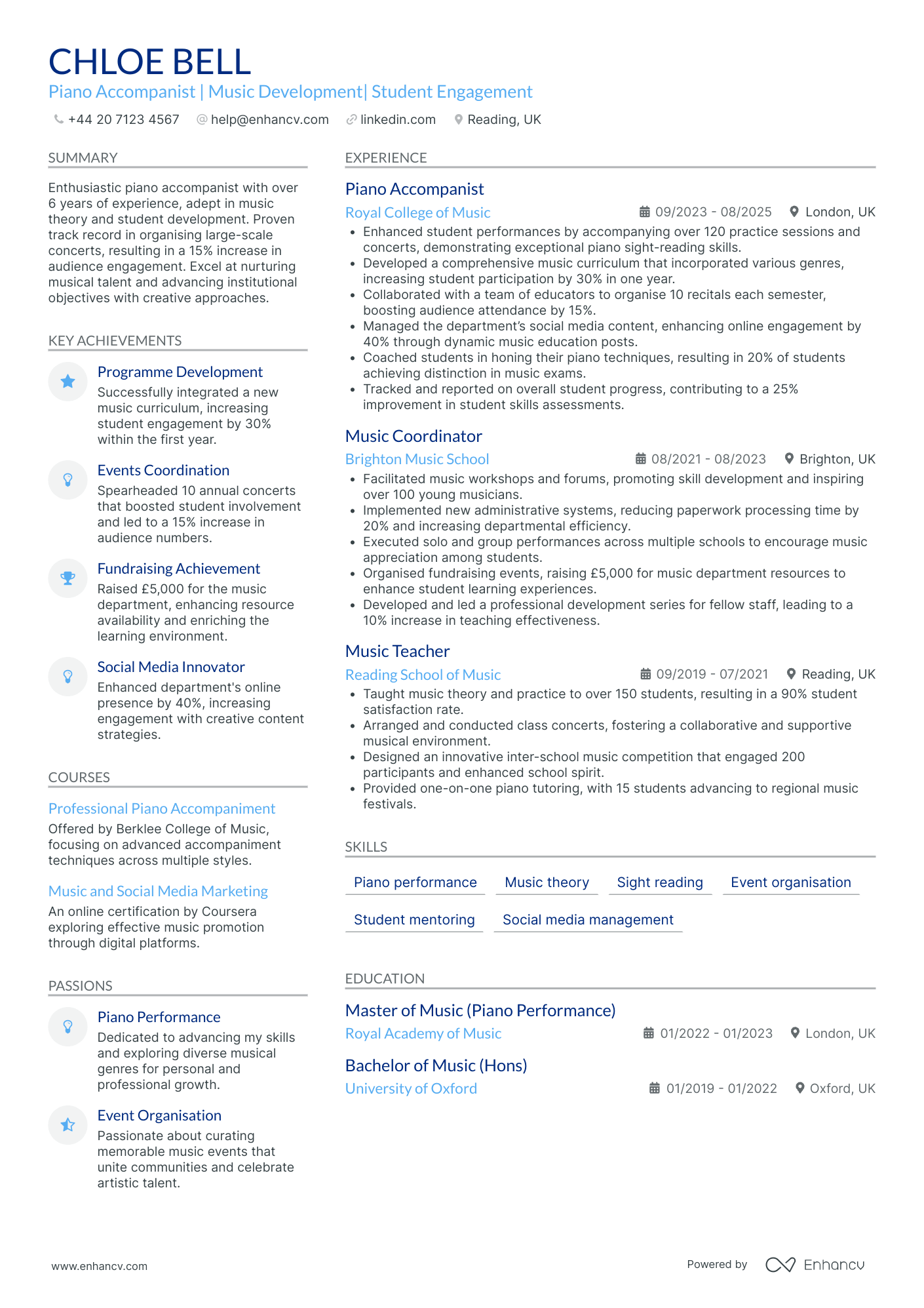Crafting a CV that effectively showcases your diverse range of performances can be a daunting task for musicians. Through our comprehensive guide, you will learn how to articulate your unique experiences and skills, ensuring your CV resonates with potential employers and auditions panels alike.
- Answer job requirements with your musician CV and experience;
- Curate your academic background and certificates, following industry-leading CV examples;
- Select from +10 niche skills to match the ideal candidate profile
- Write a more succinct experience section that consists of all the right details.
Do you need more specific insights into writing your musician CV? Our guides focus on unique insights for each individual role:
CV examples for musician
By Role
Classical Orchestra Musician
- Clear and Structured Presentation - The CV exhibits a well-organized structure that immediately conveys the essential information, starting with an engaging summary and followed by succinct sections for professional experience, achievements, skills, and education. This clarity facilitates an easy understanding of the candidate's qualifications.
- Progressive Career Development - Elsie Murray's career trajectory showcases significant growth, from a String Instruments Educator to a notable Orchestra and Music Teacher. This progression reflects her commitment to advancing her career within music education, backed by increasing responsibility and impact demonstrated at each stage.
- Innovative Teaching Methodologies - The CV highlights unique industry-specific methodologies, such as the development of tailored lesson plans and thematic music curriculums. These innovations exhibit her commitment to advancing music education through creative approaches that significantly enhance student performance and engagement.
Jazz Ensemble Musician
- Strategically Structured Content - The CV is meticulously organized, with a clear and logical structure that facilitates quick access to key information. Each section, from experience to education, is laid out methodically to highlight the candidate's career progress and competencies effectively, ensuring that the reader grasps the depth of the candidate's expertise swiftly.
- Highlighting Robust Career Progression - The trajectory evident in this CV shows a strong upward movement from a Music Instructor to a Music Director. This path not only showcases an expansion in responsibilities but also reflects the candidate's ability to adapt and excel in progressively senior roles. The transitions between roles underscore their consistent professional development in the music education and performance sectors.
- Unique Blend of Musical Expertise and Education - The CV highlights the candidate's deep knowledge and use of industry-specific methodologies in both music direction and education. This includes their application of innovative ensemble programming and their leadership in designing fundraising initiatives, underscoring a unique blend of skills that serve both artistic and educational aspects of their profession.
Studio Session Musician
- Content presentation promotes clarity and engagement - The CV presents content in a logical structure, with well-defined sections for experience, education, skills, and achievements. This makes it easy to follow and understand Isabella’s career path and expertise. Bullet points within each section ensure conciseness, allowing key accomplishments and responsibilities to stand out distinctly.
- Career trajectory highlights growth and increasing leadership - Isabella's career path demonstrates steady progression from an orchestra musician to a principal position, showcasing her growth and increasing leadership responsibilities. This upward trajectory signifies consistent personal development and recognition in prestigious roles at renowned orchestras, reflecting her standing in the music industry.
- Unique industry-specific strategies and networking initiatives - The CV showcases Isabella's deep industry knowledge with her involvement in symphonic diversity projects and networking groups. These initiatives highlight her ability to innovate within her field and establish platforms for peer engagement and knowledge sharing, supporting the growth of the classical music community.
Church Musician
- Effective Presentation of Achievements - The CV excels in clearly presenting the candidate's achievements in a way that emphasizes their impact. For example, a 30% increase in choir participation and a 40% increase in festival attendance demonstrate Sophia's ability to successfully manage and grow community engagement through music, highlighting her effectiveness as a leader and organizer in the church music domain.
- Consistent Career Progression within a Specialized Field - Sophia's career trajectory is well-documented, showing a logical progression from Assistant Music Director to Music Director. This provides insight into her steady career advancement, characterized by increased responsibilities and leadership roles within church music, underscoring a deepening of expertise within her chosen field.
- Rich Industry-Specific Knowledge - The CV includes industry-specific elements like advanced choral conducting and choral repertoire development, which underline Sophia's technical depth in church music. The mention of courses such as 'Advanced Choral Conducting' and 'Worship Music Leadership Certification' points to her commitment to continuous learning, which is crucial in maintaining high-quality worship services and musical leadership.
Street Performer Musician
- Clear and Detailed Structure - The CV is meticulously organized, providing clarity and ease of navigation. Each section is clearly defined, presenting relevant information in a logical order—from personal details and summary to professional experience, education, skills, and beyond—making it easy for recruiters to quickly understand the candidate's qualifications and experience.
- Impressive Career Trajectory - Oscar Evans shows significant growth over 10 years, moving from a Freelance Percussionist with the London Symphony Orchestra to holding key positions at prestigious institutions like the Royal Academy of Dance and National Theatre. His progression highlights a deepening of expertise and an ability to adapt to diverse musical environments.
- Industry-Specific Expertise - The candidate demonstrates a strong grasp of the nuances required in dance and theatre music environments, such as the ability to create custom scores and improvise effectively during live performances. This specificity underlines a technical depth that is rare and highly valued within these niche artistic spheres.
Touring Musician
- Structured Career Progression - Daisy Shaw's career trajectory is outlined clearly, demonstrating a well-defined path from orchestral musician to a conductor and educator. Each role builds on the preceding experience, showcasing both vertical growth within the music industry and horizontal expansion into education, highlighting a broadening of expertise and influence.
- Integration of Modern Techniques - The CV highlights Daisy’s use of modern methodologies such as integrating multimedia elements into concert programming and leveraging technology in music education. These industry-specific innovations not only enhance audience engagement but also demonstrate a forward-thinking approach to traditional music performance and teaching.
- Impactful Leadership and Mentoring - Through her roles, Daisy has clearly exhibited notable soft skills, particularly in leadership and mentoring. She recruits and mentors emerging musicians, supports their growth within the orchestra, and has guided students to succeed in national competitions, all evidencing her ability to foster talent and inspire those around her.
Cruise Ship Musician
- Structured and Concise Presentation - The CV is well-organized with clear sections and concise bullet points, making it easy for employers to quickly grasp the candidate's qualifications and achievements. Each section is distinct and prioritizes relevant information, enhancing readability and assessment efficiency.
- Progressive Career Development - George Johnson’s career trajectory displays substantial growth, moving from an Event Coordinator to a Cruise Director. This progression demonstrates increasing responsibilities and expertise within the entertainment industry, highlighting his ability to thrive in leadership roles and manage large teams effectively.
- Emphasis on Leadership and Team Management - The document underscores Johnson’s leadership capabilities through repeated successes in improving team morale, enhancing performance by significant margins, and fostering an inclusive work environment. His ability to lead diverse teams aligns well with the overarching demands of a Cruise Director role.
Freelance Musician
- Clear and Structured Content Presentation - The CV is logically organized with clearly defined sections, such as experience, education, skills, courses, and achievements, making it easy for the reader to follow and understand Emily's professional journey and qualifications.
- Progressive Career Trajectory - Emily’s career path demonstrates a steady progression in the field of music education, moving from an Assistant Music Instructor to a Music Tutor. This upward career trajectory highlights her growing responsibilities and expertise in music education.
- Achievement-Driven Impact in Education - The CV effectively emphasizes significant achievements, such as a 30% increase in exam pass rates and a 40% improvement in teaching skills among junior tutors, illustrating her capacity to deliver results that positively impact student success and institutional reputation.
Music Therapist Musician
- Strategic Content Presentation - The CV's structure is straightforward yet significant, beginning with a concise summary that provides an immediate understanding of the candidate's expertise. Bullet points for each role facilitate easy reading and emphasize key achievements, offering a quick yet comprehensive view of Henry White's impact in music therapy and disability services.
- Dynamic Career Trajectory - Henry White's career progression demonstrates consistent growth and a deepening specialization in music therapy, with transitions into roles that offer increasing responsibility and scope. Starting as a Music Therapy Specialist and advancing into roles such as Music Therapist and Clinical Music Therapist, Henry shows a commitment to his field with an increasing scale of influence and leadership.
- Innovative Techniques and Program Development - This CV highlights unique aspects particular to the industry, such as pioneering remote therapy modules and designing customized therapy programs. It underscores a focus on innovation and evidence-based methodologies, positioning Henry White as a forward-thinking professional in music therapy and supportive care sectors.
Military Band Musician
- Structured Clarity and Directness - Mia Ward's CV effectively uses a structured format with clear headers and bullet points that guide the reader through each section. The content is concise yet provides all necessary information, making it easy to follow and absorb quickly.
- Demonstrated Career Progression - The career trajectory shown in the CV highlights Mia's growth from a Music Teacher to a Director of Instrumental Music. This progression reflects successful skill development and increased responsibilities, demonstrating her capability to advance within her field significantly.
- Integration of Unique Educational Methods - Mia's experience displays a deep engagement with innovative education methodologies, such as developing inclusive strategies and integrating jazz modules into the curriculum. These elements demonstrate her commitment to diversifying and enhancing the learning experience for students.
Pit Orchestra Musician
- Comprehensive Career Development - The CV narrates a logical career trajectory, showcasing consistent progress from a Music Coordinator role to a Music Teacher and finally an Assistant Music Director. This progression illustrates an increased level of responsibility and leadership over time.
- Clear Focus on Impactful Achievements - Each position's impact is underscored by achievements like improving music program participation and boosting community engagement. These accomplishments are not only quantified but also contextualized to demonstrate their broader implications on school reputation and student development.
- Innovative Use of Technology in Music Education - Unique aspects such as the integration of instructional technology into music curricula highlight Sophia's forward-thinking approach. This application of modern tools demonstrates her commitment to enhancing learning experiences and outcomes through technological advancements.
Music Teacher Musician
- Structured and Clear Representation - The CV is organized methodically, with each section flowing logically from one to the next. It concisely presents key information such as professional experience, education, skills, and achievements, making it easy for potential employers to quickly understand Harper Webb's qualifications and career accomplishments.
- Impressive Career Development - Harper's career trajectory is notable for its clear advancement in the field of music education. Progressing from a Music Instructor to a Music Teacher and ultimately to a Head of Music Department within prestigious institutions reflects Harper's commitment to music education and leadership abilities. It demonstrates a continuous upward movement indicative of both personal growth and professional accomplishment.
- Integration of Technology in Music Education - This CV highlights Harper Webb's innovative approach to integrating digital technology in music education. By developing digital music curricula and establishing a digital music studio, Harper stands out as a forward-thinking educator who enhances learning experiences and engagement through modern tools. This emphasizes their capability to adapt to and incorporate industry-specific technologies effectively.
Symphony Orchestra Musician
- Logical Structure and Clarity - The CV is organized with clear sections, such as experience, education, skills, and achievements, allowing for easy navigation and ensuring that key information is readily accessible. This structured approach, coupled with concise language, effectively presents the candidate's qualifications.
- Impressive Career Progression in Music - William's career trajectory demonstrates significant growth, from an orchestra player at the Royal Opera House Orchestra to a lead violinist at the Liverpool Philharmonic. This progression reflects both expertise and enhanced responsibilities, highlighting a robust career in the orchestral domain.
- Integration of Musical Leadership and Education - The CV uniquely captures industry-specific methodologies, such as organizing musical arrangements and leading workshops. These elements underscore technical depth and a commitment to fostering educational outreach, positioning William as both a musician and an innovator in musical education.
Film Scoring Musician
- Clear Presentation and Specialized Focus - The CV impressively lays out Noah's qualifications through a structured approach; highlighting his journey across prominent cruise lines, it reflects a clear specialization in live musical performance and passenger entertainment on the seas.
- Showcase of Achievements in Guest Engagement - Noah's career trajectory is supported by well-documented achievements, such as boosting guest satisfaction scores by 15% and enhancing audience engagement through creative interaction initiatives. These not only underline his ability to elevate guest experiences but also demonstrate a unique knack for audience connection in varied maritime settings.
- Emphasis on Adaptability and Multi-genre Expertise - The CV highlights Noah's adaptability across musical styles, which is vital in catering to the diverse tastes of cruise passengers. His role in leading music workshops and adapting performances based on audience interaction reflects his flexibility and cross-functional capabilities in the cruise entertainment industry.
Backup Musician
- Structured and Clear Presentation - The CV presents Alice Barnes's qualifications in a structured manner, making effective use of headers and bullet points to enhance readability. Each section is clearly delineated, allowing potential employers to quickly identify her skills, experience, and education relevant to the role of a music minister. This clarity in organization ensures that all essential information is easily accessible without overwhelming the reader.
- Demonstrated Career Growth and Specialization - Alice's career trajectory shows a clear progression in the field of church music, moving from a Choir Coordinator to an Assistant Music Director and currently serving as a Music Minister. This upward movement highlights her growing responsibilities and expertise in the domain, underscoring her commitment and specialization in liturgical music and leadership.
- Industry-Specific Tools and Methodologies - The CV highlights Alice's application of specialized methodologies such as innovative rehearsal techniques and cantor training programs, which are critical for a role in music ministry. Her experience in selecting music that enhances liturgical richness and the successful implementation of training programs demonstrate her deep understanding and application of industry-specific practices.
Music Producer Musician
- Clear Content Structure - The CV efficiently presents Freya Richardson's career in a well-organized manner, using concise language and clearly separated sections. Each section is distinctly marked, allowing readers to easily follow her career trajectory and understand her professional story.
- Progressive Career Growth - Freya's career path demonstrates a steady progression, highlighting advancements from a Content Creator to a Digital Content Manager. This upward mobility not only reflects her growing responsibility and expertise but also her ability to adapt and innovate within the dynamic music industry.
- Technical Proficiency in Industry Tools - The CV emphasizes Freya's hands-on experience with industry-standard tools such as Premiere Pro, Final Cut Pro, and Photoshop. These skills are critical in the production of high-quality digital content, positioning her as a technically adept professional capable of delivering substantial business impact.
Music Director Musician
- Clear and Structured Presentation - The CV is presented in a clear and structured manner, with distinct sections for each component of the candidate’s career. This structured format makes it easy for readers to quickly grasp the breadth of Freddie Hughes's experience and qualifications. Each section is concise, with bullet points effectively used to highlight key achievements and responsibilities.
- Impressive Career Growth - Freddie's career trajectory shows significant growth and leadership progression, from a Music Programme Coordinator to a Head of Music and finally to a Director of Music. This upward movement illustrates a history of recognized capability and leadership skills in the music education industry, adapting to roles with increasing responsibility and impact.
- Leadership and Pedagogical Expertise - The CV highlights Freddie's proficiency in leadership and pedagogy, showcased through roles involving curriculum development, strategic planning, and international collaborations. This indicates a strong ability to lead educational initiatives, inspire teams, and make strategic decisions that enhance learning environments and student success.
Recording Artist Musician
- Concise and clear presentation - The CV is structured logically with clear headings and bullet points, allowing the reader to quickly understand Max Wright's qualifications and track record in the music industry. The information is presented concisely, providing just enough detail to showcase skills and achievements without overwhelming the reader.
- Proven career growth through industry involvement - Max's career trajectory demonstrates a clear progression from a Music Community Engagement Specialist to leading roles like Community Relations Manager, highlighting a pattern of increasing responsibility and influence within prominent organizations in the music industry. This growth underscores Max's ability to adapt and excel in various niches of the music sector.
- Impactful achievements with significant business relevance - The CV gives particular attention to the measurable impact of Max's contributions, such as a 45% increase in studio engagement and tripling social media engagement. These achievements are crucial as they translate into tangible business benefits, like enhanced community relations and increased artist collaborations, vital for a Community Artist Liaison role.
Music Tutor Musician
- Clear Structure and Conciseness - The CV is well-organized with distinct sections like experience, education, skills, and achievements, making it easy for the reader to locate relevant information quickly. Each bullet point is concise, yet detailed enough to convey the full scope of responsibilities and accomplishments.
- Adaptability and Cross-Functional Experience - Eva Fisher's ability to adapt is evident in her seamless transition into remote teaching, maintaining a 95% lesson attendance rate. Her collaboration with the art department to enhance student engagement showcases her versatility and capacity to work across disciplines, enriching the students’ learning experience.
- Industry-Specific Methodologies and Tools - The integration of digital tools for remote teaching and the development of participatory curriculums indicate Eva's forward-thinking approach. By leveraging technology and fostering interdisciplinary creativity, she stays at the cutting edge of music education, directly benefiting her students.
Accompanist Musician
- Strategic Career Growth - Chloe's career trajectory shows a strategic shift from a music teacher to a piano accompanist and eventually a music coordinator, reflecting an upward growth in both responsibility and impact within the field of music education.
- Cohesive Presentation of Skills - The CV is structured to present Chloe's skills concisely, aligning piano performance, event organization, and student mentoring directly with her professional experience, thus offering a clear connection between her skills and expertise in music development.
- Achievements with Tangible Impact - The CV emphasizes achievements in a business-relevant context, showcasing Chloe's ability to enhance student engagement, boost audience numbers, and raise significant funds, reflecting her effective contribution to institutional goals and impact beyond mere numeric accomplishments.
How complex should the format of your musician CV be?
Perhaps, you decided to use a fancy font and plenty of colours to ensure your musician CV stands out amongst the pile of other candidate profiles. Alas - this may confuse recruiters. By keeping your format simple and organising your information coherently, you'll ultimately make a better impression. What matters most is your experience, while your CV format should act as complementary thing by:
- Presenting the information in a reverse chronological order with the most recent of your jobs first. This is done so that your career history stays organised and is aligned to the role;
- Making it easy for recruiters to get in touch with you by including your contact details in the CV header. Regarding the design of your CV header, include plenty of white space and icons to draw attention to your information. If you're applying for roles in the UK, don't include a photo, as this is considered a bad practice;
- Organising your most important CV sections with consistent colours, plenty of white space, and appropriate margins (2.54 cm). Remember that your CV design should always aim at legibility and to spotlight your key information;
- Writing no more than two pages of your relevant experience. For candidates who are just starting out in the field, we recommend to have an one-page CV.
One more thing about your CV format - you may be worried if your double column CV is Applicant Tracker System (ATS) complaint. In our recent study, we discovered that both single and double-column CVs are ATS-friendly . Most ATSes out there can also read all serif and sans serif fonts. We suggest you go with modern, yet simple, fonts (e.g. Rubik, Lato, Raleway) instead of the classic Times New Roman. You'll want your application to stand out, and many candidates still go for the classics. Finally, you'll have to export your CV. If you're wondering if you should select Doc or PDF, we always advise going with PDF. Your CV in PDF will stay intact and opens easily on every OS, including Mac OS.

PRO TIP
Be mindful of white space; too much can make the CV look sparse, too little can make it look cluttered. Strive for a balance that makes the document easy on the eyes.

The top sections on a musician CV
- Personal Details include your name, contact info, and instruments played, essential for identification and communication.
- Professional Experience highlights your past musical engagements, showcasing your experience and versatility.
- Music Education details your formal training, emphasising your theoretical knowledge and technical proficiency.
- Discography or Performance Credits show your recordings and live performances, reflecting your industry contribution.
- Skills and Abilities list your unique talents, from instrument mastery to music software expertise, relevant to the field.

What recruiters value on your CV:
- Highlight your musical education and formal training, detailing any degrees, diplomas, or relevant coursework that underscores your proficiency and knowledge in music.
- Emphasize your performance experience, including concerts, gigs, recitals, and tours, specifying the venues, dates, and the nature of each performance.
- Include a comprehensive list of your repertoire or notable pieces you've performed or composed, as it demonstrates your versatility and the breadth of your skills.
- Document any recordings or publications you have, citing any albums, EPs, singles, or scores that have been released, and provide links if they are available online.
- Offer references from credible sources, such as conductors, music directors, or educators you've worked with who can vouch for your skills, professionalism, and musicianship.
Recommended reads:
Making a good first impression with your musician CV header
Your typical CV header consists of Your typical CV header consists of contact details and a headline. Make sure to list your professional phone number, email address, and a link to your professional portfolio (or, alternatively, your LinkedIn profile). When writing your CV headline , ensure it's:
- tailored to the job you're applying for;
- highlights your unique value as a professional;
- concise, yet matches relevant job ad keywords.
You can, for examples, list your current job title or a particular skill as part of your headline. Now, if you decide on including your photo in your CV header, ensure it's a professional one, rather than one from your graduation or night out. You may happen to have plenty more questions on how to make best the use of your CV headline. We'll help you with some real-world examples, below.

Examples of good CV headlines for musician:
- Lead Vocalist & Songwriter | Recording Artist | Versatile Performer | BA Hons Music | 5+ Years Experience
- Classical Concert Pianist | Music Director | Chamber Music Specialist | MA Performance | 10 Years Mastery
- Session Guitarist | Studio Recording Expert | Rock & Blues Focus | Grade 8 Guitar | 3 Years Professional
- Jazz Saxophonist | Composer | Music Educator | PhD in Music Theory | Over 15 Years of Performances
- Professional Drummer | Rhythm Section Leader | Touring Experience | Diploma in Music Performance | 7 Years on Stage
- Orchestral Violinist | Solo Performer | String Quartet Member | Advanced Diploma of Music | 12 Years in Symphony
Your musician CV introduction: selecting between a summary and an objective
musician candidates often wonder how to start writing their resumes. More specifically, how exactly can they use their opening statements to build a connection with recruiters, showcase their relevant skills, and spotlight job alignment. A tricky situation, we know. When crafting you musician CV select between:
- A summary - to show an overview of your career so far, including your most significant achievements.
- An objective - to show a conscise overview of your career dreams and aspirations.
Find out more examples and ultimately, decide which type of opening statement will fit your profile in the next section of our guide:

CV summaries for a musician job:
- Classically trained pianist with over 15 years of experience performing in international concert halls. Adept in a broad repertoire ranging from Baroque to contemporary with a significant track record, including a sold-out solo recital at the Royal Albert Hall.
- Dynamic vocalist and songwriter with 10 years of professional experience, skilled in composition and arrangement. Proven ability to captivate audiences, with a highlight performance featured on the BBC Proms, and adept in using Pro Tools and Logic Pro for music production.
- Highly seasoned project manager pivoting into the music industry, bringing over a decade of experience in leading cross-functional teams. Proficient in budget management and strategic planning, eager to apply transferable skills to foster creative collaborations in music production.
- Dedicated marketing professional with an MBA transitioning into the world of music event management. Skilful in digital marketing campaigns and brand development, with a passion for live music and a keen interest in promoting emerging artists through innovative event strategies.
- Seeking to leverage a lifelong passion for music and a recent degree in Music Theory and Composition to contribute to a dynamic orchestra. Eager to provide fresh insights and harness skills in sight-reading and orchestration to enhance musical performances.
- Ambitious and fresh graduate aiming to embark on a musical journey, utilizing a Bachelor's degree in Music Production and sound engineering expertise to deliver high-quality audio experiences. Driven by a commitment to learning and excellence in live sound reinforcement.
How to meet job requirements with your musician CV experience
We've now reached the essence of your actual CV - your experience section. This is the space where you can list your career roles and on-the-job successes. Many candidates tend to underestimate just how much time and effort they should put into writing this CV section. Your experience shouldn't be a random list of your responsibilities, but instead:
- Match the job description with your skills, values, and accomplishments;
- Start each bullet with a strong action verb, followed up with one key skill and your outcome of applying this skill;
- Spotlight parts of your career history that are relevant to the job you're applying for.
Before we move on, make sure to check out some professional CV experience sections.

Best practices for your CV's work experience section
- Outlined significant performances, including venues, dates, and the works performed, highlighting any solo or featured appearances with orchestras or ensembles.
- Documented collaborations with notable artists or orchestras, specifying the nature of the collaboration and the repertoire covered.
- Included leadership roles such as concertmaster, bandleader, or musical director, noting the duration of the tenure and key accomplishments.
- Described any composition or arrangement projects, including performances or recordings of these works, to showcase creativity and versatility.
- Listed recording experience, whether studio or live, citing any commercially released albums, EPs, or singles.
- Provided details of any musical education and training, emphasising degrees or diplomas earned, and masterclasses or workshops attended.
- Highlighted teaching experience, including private tuition or educational outreach programmes, specifying any notable achievements of students.
- Referenced awards, competitions, or grants won, emphasising the prestige of the award and the competition involved.
- Noted experience with music technology, including proficiency in DAWs, notation software, or other relevant audio production tools.
- Performed live in over 200 shows internationally with the London Symphony Orchestra, leading to a substantial increase in their following on social media platforms by 40%.
- Collaborated with high-profile conductors and composers to create and premiere original works, piquing the interest of both new and traditional classical music audiences.
- Mentored junior musicians, enhancing the overall performance quality and cultivating a supportive and educational environment within the orchestra.
- Composed and arranged scores for over 15 advertising campaigns for international brands, achieving increased audience engagement rates by over 25%.
- Efficiently managed studio recording sessions, ensuring projects were completed within budget and garnering positive reviews for sound quality in industry publications.
- Navigated complex copyright issues, ensuring legal compliance and protecting the interests of both agency and clients, thereby avoiding costly litigation.
- Engaged nightly audiences upward of 500 guests as the lead guitarist at the iconic Jazz Café, contributing to a 20% rise in venue ticket sales over 2 years.
- Initiated a successful social media campaign to promote seasonal performances, resulting in booking deals with three major music festivals.
- Crafted bespoke arrangements for special events, including weddings and corporate parties, delivering personalized service and leading to a 30% repeat client rate.
- Led an ensemble in weekly performances at the prestigious Ronnie Scott's Jazz Club, consistently selling out and expanding the club's membership by 15%.
- Directed music programming that resulted in a 50% increase in average customer spend per visit by enhancing the overall dining experience through carefully curated performances.
- Established a talent development program that supported emerging artists, resulting in two of the musicians being signed by major labels.
- Conducted extensive international tours which grew the fan base by 60% and significantly boosted merchandise sales for the indie rock band, The Night Chasers.
- Implemented a digital distribution strategy for our EPs that tripled our online streaming revenue within the first year.
- Collaborated with a team of sound engineers to optimize live sound quality, heavily influencing positive critical reviews and an increase in live performance invitations.
- Composing film scores for major Hollywood productions, with my latest work on 'The Distant Echo' contributing to its nomination for 'Best Original Score' at the BAFTAs.
- Spearheading a collaborative project with international musicians to create a crossover album, which was featured in the Top 10 World Music charts for 12 consecutive weeks.
- Regularly conducting workshops and masterclasses at music conservatories, focusing on film scoring techniques, which have enhanced the institutions' academic reputation.
- Revitalized the live music offerings of the Blue Note Jazz Club, elevating the venue to a top-rated hotspot and witnessing a 35% increase in patron attendance.
- Collaborated with a diverse roster of international artists to curate exceptional live collaborations, generating a 20% growth in media coverage for the club.
- Designed and implemented a youth jazz education program, fostering talent and increasing community engagement by involving over 150 students annually.
- Orchestrated and performed over 300 unique musical pieces in the West End production of 'Les Misérables', playing to over 1,000 patrons nightly and consistently achieving 90% occupancy.
- Pioneered the use of digital sound mixing technology for the theatre, greatly enhancing audio clarity and contributing to the show receiving an Olivier Award for sound design.
- Crafted music workshops for the cast, leading to improved performances and contributing to the show's long-standing success.
Swapping your professional experience (when you have none) with skills and more
Never underestimate the importance of relevancе when it comes to your musician CV. Even if you don't happen to have much or any standard (full-time contract) professional experience, this doesn't mean you shouldn't apply for the role. Instead of a bespoke CV experience section:
- Showcase more prominently any internships, part-time roles, and volunteer experience that are applicable to the role and have taught you job-crucial skills;
- Feature a strengths or achievements section with your transferrable skills or talents you've obtained thanks to your work or life experience;
- Write an objective statement that clearly outlines your values as a candidate and defines your career ambitions;
- List your education or certificates that match the job profile closer to the top of your CV.
Recommended reads:

PRO TIP
If applicable, briefly mention a situation where things didn’t go as planned and what you learned from it, demonstrating your ability to learn and adapt.
Describing your unique skill set using both hard skills and soft skills
Your musician CV provides you with the perfect opportunity to spotlight your talents, and at the same time - to pass any form of assessment. Focusing on your skill set across different CV sections is the way to go, as this would provide you with an opportunity to quantify your achievements and successes. There's one common, very simple mistake, which candidates tend to make at this stage. Short on time, they tend to hurry and mess up the spelling of some of the key technologies, skills, and keywords. Copy and paste the particular skill directly from the job requirement to your CV to pass the Applicant Tracker System (ATS) assessment. Now, your CV skills are divided into:
- Technical or hard skills, describing your comfort level with technologies (software and hardware). List your aptitude by curating your certifications, on the work success in the experience section, and technical projects. Use the dedicated skills section to provide recruiters with up to twelve technologies, that match the job requirements, and you're capable of using.
- People or soft skills provide you with an excellent background to communicate, work within a team, solve problems. Don't just copy-paste that you're a "leader" or excel at "analysis". Instead, provide tangible metrics that define your success inusing the particular skill within the strengths, achievements, summary/ objective sections.
Top skills for your musician CV:
Instrumental proficiency
Music theory knowledge
Sight-reading
Improvisation
Composition
Audio production
Music technology proficiency
Repertoire selection
Music transcription
Stage presence
Creativity
Passion for music
Patience
Dedication
Collaboration
Time management
Adaptability
Attention to detail
Self-motivation
Listening skills

PRO TIP
Use mini case studies or success stories in your CV to demonstrate how your skills have positively impacted previous roles or projects.
Listing your university education and certificates on your musician CV
The best proof of your technical capabilities would be your education and certifications sections. Your education should list all of your relevant university degrees, followed up by their start and completion dates. Make sure to also include the name of the university/-ies you graduated from. If you happen to have less professional experience (or you deem it would be impressive and relevant to your application), spotlight in the education section:
- that you were awarded a "First" degree;
- industry-specific coursework and projects;
- extracurricular clubs, societies, and activities.
When selecting your certificates, first ask yourself how applicable they'd be to the role. Ater your initial assessment, write the certificate and institution name. Don't miss out on including the completion date. In the below panel, we've curated relevant examples of industry-leading certificates.

PRO TIP
If there's a noticeable gap in your skillset for the role you're applying for, mention any steps you're taking to acquire these skills, such as online courses or self-study.
Recommended reads:
Key takeaways
Your successful job application depends on how you well you have aligned your musician CV to the job description and portrayed your best skills and traits. Make sure to:
- Select your CV format, so that it ensures your experience is easy to read and understand;
- Include your professional contact details and a link to your portfolio, so that recruiters can easily get in touch with you and preview your work;
- Write a CV summary if you happen to have more relevant professional experience. Meanwhile, use the objective to showcase your career dreams and ambitions;
- In your CV experience section bullets, back up your individual skills and responsibilities with tangible achievements;
- Have a healthy balance between hard and soft skills to answer the job requirements and hint at your unique professional value.
